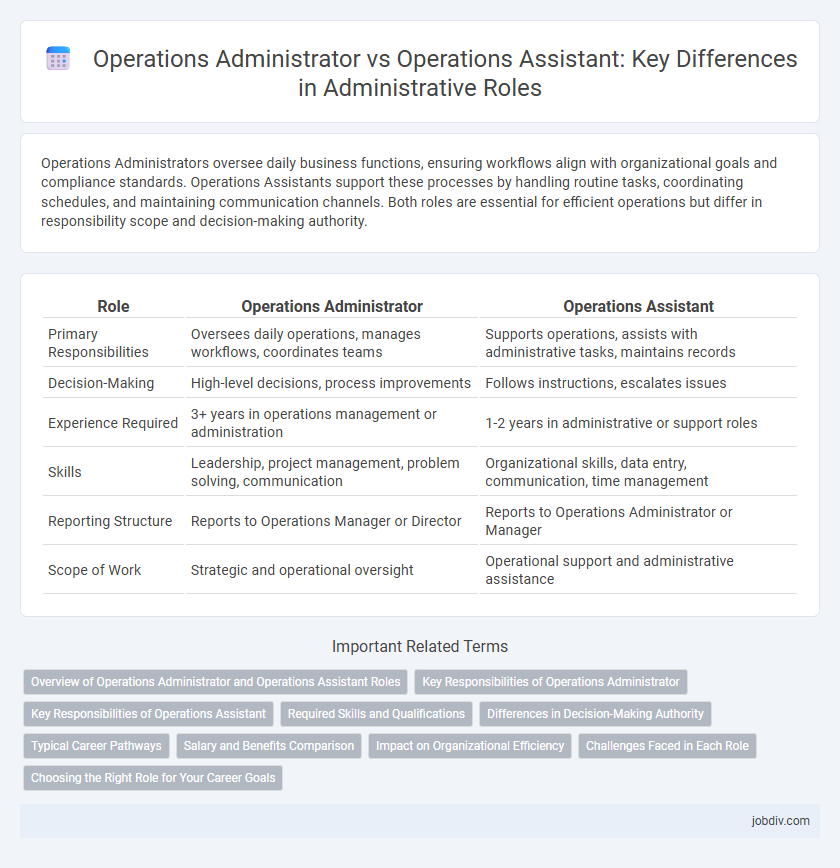Operations Administrators oversee daily business functions, ensuring workflows align with organizational goals and compliance standards. Operations Assistants support these processes by handling routine tasks, coordinating schedules, and maintaining communication channels. Both roles are essential for efficient operations but differ in responsibility scope and decision-making authority.
Table of Comparison
| Role | Operations Administrator | Operations Assistant |
|---|---|---|
| Primary Responsibilities | Oversees daily operations, manages workflows, coordinates teams | Supports operations, assists with administrative tasks, maintains records |
| Decision-Making | High-level decisions, process improvements | Follows instructions, escalates issues |
| Experience Required | 3+ years in operations management or administration | 1-2 years in administrative or support roles |
| Skills | Leadership, project management, problem solving, communication | Organizational skills, data entry, communication, time management |
| Reporting Structure | Reports to Operations Manager or Director | Reports to Operations Administrator or Manager |
| Scope of Work | Strategic and operational oversight | Operational support and administrative assistance |
Overview of Operations Administrator and Operations Assistant Roles
Operations Administrators oversee the coordination and management of daily operational activities, ensuring efficiency in workflow, resource allocation, and compliance with company policies. Operations Assistants support administrative tasks by handling scheduling, data entry, and communication, enabling smooth execution of operational processes. Both roles are critical in maintaining seamless organizational functions, with the administrator focusing on strategic oversight and the assistant on task-level support.
Key Responsibilities of Operations Administrator
Operations Administrators oversee and coordinate daily operational activities, ensuring seamless workflow and effective resource allocation to meet organizational goals. They manage process improvements, monitor compliance with company policies, and collaborate with different departments to optimize operational efficiency. Their role includes supervising support staff, managing budgets, and handling key communications with external stakeholders to maintain smooth business functions.
Key Responsibilities of Operations Assistant
Operations Assistants support daily business functions by handling scheduling, coordinating communication between departments, and managing administrative tasks such as data entry and document preparation. They ensure smooth workflow by maintaining records, assisting with inventory management, and facilitating task prioritization for operational efficiency. Their role centers on providing essential support to operational teams, enabling effective execution of organizational processes.
Required Skills and Qualifications
Operations Administrators require advanced skills in project management, data analysis, and leadership, often holding a bachelor's degree in business administration or a related field. Operations Assistants focus on organizational skills, attention to detail, and proficiency in office software, typically needing a high school diploma or associate degree with some administrative experience. Both roles demand strong communication abilities and a solid understanding of operational procedures, but the administrator role demands higher-level qualifications and strategic thinking capabilities.
Differences in Decision-Making Authority
Operations Administrators possess greater decision-making authority, overseeing process improvements and resource allocation to optimize operational efficiency. Operations Assistants primarily support these decisions by executing assigned tasks and managing routine administrative duties with limited autonomy. The distinction lies in administrators' strategic oversight compared to assistants' operational support functions.
Typical Career Pathways
Operations Administrators often progress to roles such as Operations Manager or Business Operations Director, leveraging their experience in overseeing daily functions and optimizing processes. Operations Assistants typically advance into Operations Administrator positions by gaining hands-on experience and developing skills in coordination and support activities. Both roles serve as foundational steps toward leadership positions in administrative and operational management.
Salary and Benefits Comparison
Operations Administrators typically earn higher salaries than Operations Assistants due to greater responsibilities, with median pay ranging from $55,000 to $75,000 annually compared to $35,000 to $50,000 for assistants. Benefits for Operations Administrators often include health insurance, retirement plans, and performance bonuses, reflecting their senior role in organizational management. Operations Assistants generally receive basic benefits packages such as health coverage and paid time off, with fewer incentives tied directly to operational outcomes.
Impact on Organizational Efficiency
Operations Administrators drive organizational efficiency by overseeing complex processes, streamlining workflows, and managing resources strategically. Operations Assistants support daily tasks and coordinate administrative duties, enabling smoother operations but with limited decision-making authority. The Administrator's role significantly enhances long-term efficiency through leadership and optimization, while the Assistant ensures consistent execution of routine functions.
Challenges Faced in Each Role
Operations Administrators grapple with challenges like managing complex workflows, ensuring compliance with company policies, and coordinating cross-departmental projects under tight deadlines. Operations Assistants face difficulties including handling routine administrative tasks, supporting team communication, and managing data entry accuracy while adapting to shifting priorities. Both roles require strong organizational skills, but Administrators encounter higher strategic responsibilities, whereas Assistants focus on operational support and execution.
Choosing the Right Role for Your Career Goals
An Operations Administrator oversees complex processes, manages teams, and drives strategic improvements, making it ideal for professionals aiming for leadership roles. An Operations Assistant supports daily administrative tasks, coordinates logistics, and ensures smooth workflow, suitable for those seeking entry-level experience in operations. Aligning your choice with career aspirations involves evaluating your desire for responsibility, skill development, and long-term growth within organizational operations.
Operations Administrator vs Operations Assistant Infographic

 jobdiv.com
jobdiv.com